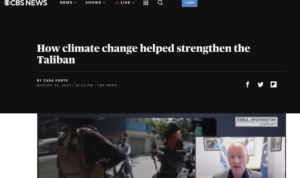https://www.cbsnews.com/news/climate-change-taliban-strengthen/
BY CARA KORTE
Rural Afghanistan has been rocked by climate change. The past three decades have brought floods and drought that have destroyed crops and left people hungry. And the Taliban — likely without knowing climate change was the cause — has taken advantage of that pain.
In the mountainous north, snow and glaciers have melted more quickly and earlier than ever before, at times flooding fields and irrigation systems, but also leading to snowmelt-related drought in the winter. In the south and west, some areas have seen heavy precipitation events increase by 10 to 25% over the past 30 years.
Those regions are often left reeling, without adequate aid from the former government.
“With poverty and war and everything else, climate change is the last thing on anyone’s mind,” said Alam.
Today, one-third of Afghans are in “crisis” or “emergency” levels of food insecurity due to drought, a danger potentially more threatening than the historic 2018 drought that left thousands dead.
Farajalla said even Afghans who move into the urban areas in order to leave the stress of farming behind still cannot escape the pressures of “people of ill repute.”
“They become destitute enough to be given a few dollars to join this party or that group.”
The ripples of these climate-spurned Afghans can last for years. Farajalla said farmers who abandon their land often leave their families behind, arguably making those children easier recruiting targets for extremism.
Climate change has fueled terrorism and civil unrest elsewhere in the world. Boko Haram gripped water-scarce central Africa in 2017 as they gained footholds along the Lake Chad Basin. ISIS has taken advantage of agrarian communities suffering from extreme drought in Iraq and Syria. Farajalla said arid or semi-arid areas in impoverished countries with low levels of education and poor infrastructure are all ripe for extremism.
The Taliban has not only used farmers and rural communities to fortify their ranks, but also to help fund their efforts by taxing farmers on their territory. Most crucially, they have controlled the uber-lucrative poppy trade in Afghanistan.
The country is the world’s leading supplier of opium poppies. Not only has the Taliban made billions from their illicit drug trade, but poppies require less water than other crops, providing more stable means to struggling farming communities. Poppy cultivation is most abundant in the south of the country, where drought in part fueled by climate change has been the most severe and the Taliban is most popular.
These partnerships have helped the Taliban’s popularity. But since taking control of the country, the group has vowed to make the nation poppy-free — a tenuous political decision that would not be popular with the rural communities that rely on the crop, said Vanda Felbab-Brown, director of the Initiative on Nonstate Armed Actors and a senior fellow at the Brookings Institution.
“If they went to go for the ban quickly, they would cause themselves a huge economic downturn. They would set off massive miseration of the population. And they would have real problems with maintaining stability,” she said.
“Their own fighters often harvest poppy. For many of the fighters, poppy was the principal source to help them fund their family and themselves. They could do jihad for months but would have to disengage to harvest so the family had food.”



